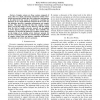Free Online Productivity Tools
i2Speak
i2Symbol
i2OCR
iTex2Img
iWeb2Print
iWeb2Shot
i2Type
iPdf2Split
iPdf2Merge
i2Bopomofo
i2Arabic
i2Style
i2Image
i2PDF
iLatex2Rtf
Sci2ools
126
Voted
DEXAW
2004
IEEE
2004
IEEE
A Complex Systems Approach to Service Discovery
Complex systems are those systems composed of many, often very simple, interacting autonomous entities. Interactions between these entities give rise to behaviour and patterns at the global level that cannot be predicted by examining the behaviour of any single individual component in the system. By this definition, pervasive computing environments are complex systems. This paper develops the idea that complex systems theory can aid the design of service discovery, and that results from the field of complex networks research can be applied to service discovery protocols to improve their scalability and robustness. We describe the influences of complex systems theory on the design of an existing service discovery protocol for pervasive computing environments, and show that the application of complex systems ideas can improve scalability, performance and robustness of service discovery protocols.
Related Content
| Added | 20 Aug 2010 |
| Updated | 20 Aug 2010 |
| Type | Conference |
| Year | 2004 |
| Where | DEXAW |
| Authors | Ricky Robinson, Jadwiga Indulska |
Comments (0)

